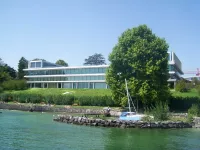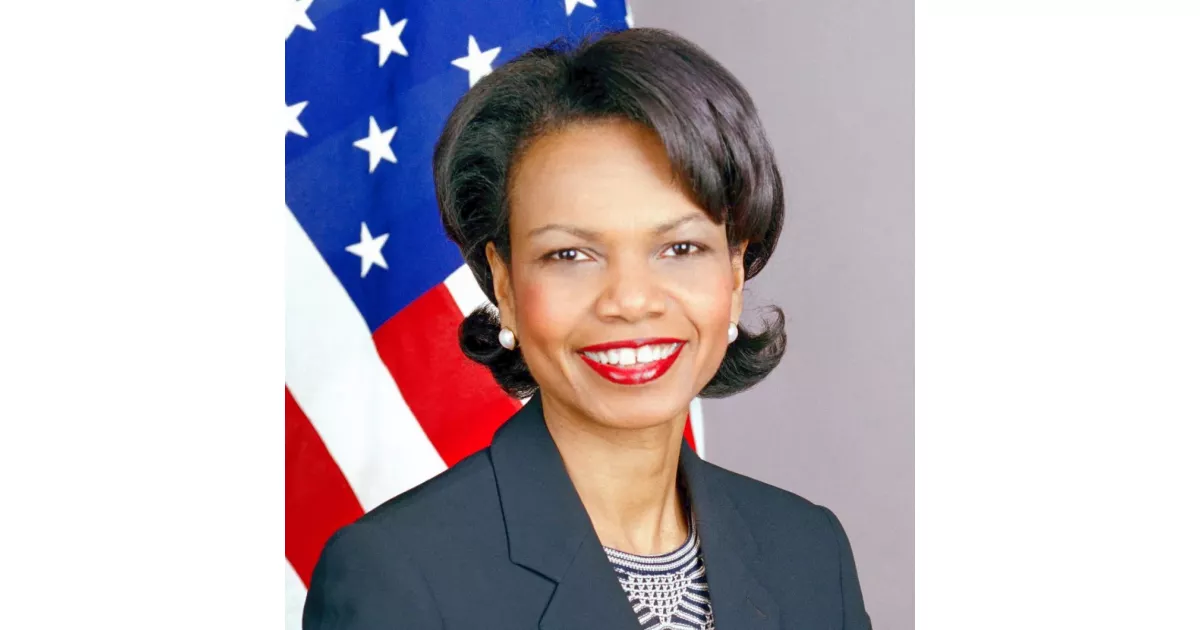Discover the career path of Condoleezza Rice, from the first major opportunity to industry-changing achievements.
Condoleezza Rice is a prominent American diplomat and political scientist, currently serving as the director of Stanford University's Hoover Institution. A Republican, she held significant roles in the George W. Bush administration, including as the 66th United States Secretary of State (2005-2009) and the 19th U.S. National Security Advisor (2001-2005). Rice made history as the first female African-American Secretary of State and the first woman to be National Security Advisor. Before Barack Obama's presidency, she and Colin Powell were the highest-ranking African Americans in the executive branch. Upon becoming Secretary of State, she was the highest-ranking woman in U.S. presidential line of succession at the time.
1977: First work in State Department
In 1977, Condoleezza Rice first worked in the State Department during the Carter administration as an intern in the Bureau of Educational and Cultural Affairs.
1981: Hired by Stanford University
In 1981, Condoleezza Rice was hired by Stanford University as an assistant professor of political science.
1985: Meeting of Arms Control Experts
In 1985, at a meeting of arms control experts at Stanford, Condoleezza Rice's performance attracted the attention of Brent Scowcroft.
1986: Special Assistant to the Director of the Joint Chiefs of Staff
In 1986, Condoleezza Rice was appointed special assistant to the director of the Joint Chiefs of Staff to work on nuclear strategic planning as part of a Council on Foreign Relations fellowship.
1987: Promoted to Associate Professor
In 1987, Condoleezza Rice was promoted to associate professor at Stanford University, a position she held until 1993.
1989: Joined George H. W. Bush's administration
In 1989, Condoleezza Rice joined President George H. W. Bush's administration as director, and then senior director, of Soviet and East European affairs in the National Security Council, also serving as a special assistant to the president for national security affairs.
1989: Joined National Security Council
In 1989, with the election of George H. W. Bush, Brent Scowcroft became National Security Advisor and asked Condoleezza Rice to become his Soviet expert on the United States National Security Council.
March 1991: Served in President George H. W. Bush's administration
Until March 1991, Condoleezza Rice served in President George H. W. Bush's administration as director, and then senior director, of Soviet and East European affairs in the National Security Council, and a special assistant to the president for national security affairs, during the fall of the Berlin Wall and the final days of the Soviet Union.
1991: Returned to Stanford and Joined Transamerica Board
In 1991, Condoleezza Rice returned to Stanford University and was taken under the wing of George Shultz. She was also appointed to the board of Transamerica Corporation.
1991: Returned to Stanford and appointed to bipartisan committee
In 1991, Condoleezza Rice returned to her teaching position at Stanford while consulting on the former Soviet Bloc for various clients. Later that year, California governor Pete Wilson appointed her to a committee to draw new state legislative and congressional districts.
1992: Founded Center for New Generation
In 1992, Condoleezza Rice founded the Center for New Generation, an after-school program designed to improve the high school graduation rates in East Palo Alto and eastern Menlo Park, California.
1992: Appointed to Hewlett-Packard and Chevron Boards
In 1992, Condoleezza Rice was appointed to the boards of Chevron Corporation and Hewlett-Packard.
1992: Volunteered on Search Committee
In 1992, at Stanford, Condoleezza Rice volunteered to serve on the search committee to replace outgoing president Donald Kennedy.
1993: End of Associate Professorship
In 1993, Condoleezza Rice concluded her time as associate professor at Stanford University.
1993: Appointed as Stanford Provost
In 1993, Gerhard Casper appointed Condoleezza Rice as Stanford's provost, making her the first female, first African-American, and youngest provost in Stanford's history. She was also granted tenure and became a full professor.
1997: Served on the Federal Advisory Committee
In 1997, Condoleezza Rice served on the Federal Advisory Committee on Gender–Integrated Training in the Military.
December 16, 2000: Named National Security Advisor
On December 16, 2000, Condoleezza Rice was named National Security Advisor, becoming the first woman to hold the position, and stepped down from her position at Stanford.
December 17, 2000: Joined George W. Bush administration
On December 17, 2000, Condoleezza Rice joined the George W. Bush administration as national security advisor.
2000: Foreign policy advisor for George W. Bush's campaign
During George W. Bush's 2000 presidential election campaign, Condoleezza Rice took a leave of absence from Stanford University to serve as his foreign policy advisor, leading a group called the Vulcans and giving a speech at the Republican National Convention.
2000: Republican National Convention
In 2000, Condoleezza Rice spoke at the Republican National Convention about her father's experience with the Democratic party in Jim Crow Alabama in 1952.
2000: Views on Abortion
In 2000, while helping President Bush in his campaign, Condoleezza Rice expressed libertarian views on government involvement in abortion issues, supporting parental choice, parental notification, and a ban on late-term abortions. Rice also stated that she would not want the Supreme Court decision legalizing abortion, Roe v. Wade, to be overturned.
January 15, 2001: Resignation from Chevron
On January 15, 2001, Condoleezza Rice resigned from her position as head of Chevron's committee on public policy to become National Security Advisor to President George W. Bush. Chevron had named an oil tanker after her, Condoleezza Rice, but it was later renamed Altair Voyager due to controversy.
July 10, 2001: Met with CIA director George Tenet about potential al Qaeda attack
On July 10, 2001, Condoleezza Rice held an "emergency meeting" at the White House with CIA director George Tenet to discuss the potential threat of an impending al Qaeda attack; she then requested Tenet to present the matter to Secretary Donald Rumsfeld and Attorney General John Ashcroft.
August 6, 2001: Characterized President's Daily Brief as historical information
On August 6, 2001, Condoleezza Rice characterized the President's Daily Brief, "Bin Ladin Determined To Strike in US", as historical information, stating it was based on old reporting.
September 11, 2001: Scheduled to outline new national security policy
On September 11, 2001, Condoleezza Rice was scheduled to outline a new national security policy emphasizing missile defense and downplaying stateless terrorism.
2001: Root of September 11 attacks
As Secretary of State, Rice characterized the September 11 attacks in 2001 as rooted in "oppression and despair" and so, the U.S. must advance democratic reform and support basic rights throughout the greater Middle East.
July 17, 2002: Met with CIA director George Tenet to convey approval of waterboarding
On July 17, 2002, Condoleezza Rice met with CIA director George Tenet to convey the Bush administration's approval of the proposed waterboarding of alleged Al Qaeda leader Abu Zubaydah.
December 8, 2002: Iraq delivered its declaration of weapons of mass destruction to the United Nations
After Iraq delivered its declaration of weapons of mass destruction to the United Nations on December 8, 2002, Condoleezza Rice wrote an editorial for The New York Times entitled "Why We Know Iraq Is Lying".
January 10, 2003: Rice's statement on Iraqi nuclear capabilities
In a January 10, 2003, interview with CNN's Wolf Blitzer, Condoleezza Rice stated that "we don't want the smoking gun to be a mushroom cloud" regarding Saddam Hussein's nuclear capabilities.
January 18, 2003: Involved in crafting Bush's position on race-based preferences
On January 18, 2003, The Washington Post reported that Condoleezza Rice was involved in crafting President Bush's position on race-based preferences, advocating for race to be considered as one factor among others in university admissions policies.
October 2003: Named to run the Iraq Stabilization Group
In October 2003, Condoleezza Rice was appointed to lead the Iraq Stabilization Group with the mission to quell violence and expedite reconstruction in Iraq and Afghanistan.
2003: Received the U.S. Senator John Heinz Award
In 2003, Condoleezza Rice received the U.S. Senator John Heinz Award for Greatest Public Service by an Elected or Appointed Official.
2003: Briefed on waterboarding and other methods
In 2003, Condoleezza Rice, along with Vice President Dick Cheney and Attorney General John Ashcroft, were briefed on the CIA's use of waterboarding and other interrogation methods, and they reaffirmed that the CIA program was lawful and reflected administration policy.
2003: Cheney Suggests Rice Misled President on Nuclear Diplomacy
In 2003, Dick Cheney suggested that Condoleezza Rice misled the president about nuclear diplomacy with North Korea, calling her advice "utterly misleading." He also criticized her for clashing with White House advisers on the tone of the president's speeches on Iraq and wrote that she, as the secretary of state, ruefully conceded to him that the Bush administration should not have apologized for a claim the president made in his 2003 State of the Union address, on Saddam's supposed search for yellowcake uranium..
March 2004: Declined to testify before the 9/11 Commission
In March 2004, Condoleezza Rice initially declined to testify before the National Commission on Terrorist Attacks Upon the United States (the 9/11 Commission), citing executive privilege, but later agreed under pressure from President Bush.
May 2004: The Washington Post reported that the council had become virtually nonexistent
By May 2004, The Washington Post reported that the Iraq Stabilization Group, which Condoleezza Rice was named to run, had become virtually nonexistent.
November 16, 2004: Nominated to be Secretary of State
On November 16, 2004, Condoleezza Rice was nominated by President Bush to be Secretary of State.
2004: Campained for incumbent president
Leading up to the 2004 presidential election, Condoleezza Rice became the first National Security Advisor to actively campaign for an incumbent president, arguing that Saddam Hussein's Iraq contributed to the circumstances that led to the September 11 attacks.
January 2005: Barbara Boxer Criticizes Rice at Confirmation Hearing
During Condoleezza Rice's confirmation hearing for U.S. Secretary of State in January 2005, California Democratic senator Barbara Boxer criticized Rice, stating that her loyalty to selling the war in Iraq overwhelmed her respect for the truth.
January 2005: Rice Uses "Outposts of Tyranny" Term
In January 2005, during President Bush's second inaugural ceremonies, Condoleezza Rice first used the term "outposts of tyranny" to describe countries she viewed as threats to world peace and human rights, identifying Cuba, Zimbabwe, Burma, Belarus, Iran, and North Korea as such outposts.
January 26, 2005: Senate confirmed nomination as Secretary of State
On January 26, 2005, the Senate confirmed Condoleezza Rice's nomination as Secretary of State by a vote of 85–13, with negative votes stemming from concerns about her role in Iraq and the war on terrorism.
July 29, 2005: Rice addresses ideology of hatred in foreign societies
In a speech given on July 29, 2005, Condoleezza Rice asserted that securing America from terrorist attack is more than a matter of law enforcement and that the ideology of hatred in foreign societies should be confronted by supporting the universal hope of liberty and the inherent appeal of democracy.
August 2005: Ratings Decrease After Hurricane Katrina
In August 2005, Condoleezza Rice's ratings decreased following Hurricane Katrina.
December 18, 2005: Rice discusses counter-terrorism policy
In an interview on December 18, 2005, Condoleezza Rice stated that counter-terrorism should be preventative, not punitive, as the success of a terrorist crime results in numerous deaths.
2005: Assumed Office as Secretary of State
In 2005, Condoleezza Rice assumed office as Secretary of State.
2006: Agreement for Cooperation between the United States and India
In 2006, Indian prime minister Manmohan Singh announced the Agreement for Cooperation between the United States and India involving peaceful uses of nuclear energy. Condoleezza Rice, as Secretary of State, was involved in the negotiation of this agreement.
2006: Asserted she did not recall specific July 2001 meeting
In 2006, when questioned about the July 2001 meeting with George Tenet, Condoleezza Rice asserted she did not recall that specific meeting, stating she had met repeatedly with Tenet that summer about terrorist threats and found it "incomprehensible" that she would ignore terrorist threats before the September 11 attacks.
January 11, 2007: Boxer Debates the War in Iraq
On January 11, 2007, during a debate over the war in Iraq, Barbara Boxer questioned who would pay the price for the war, highlighting the American military and their families.
February 1, 2007: Time Accuses Rice of Squandering Influence
On February 1, 2007, Time magazine accused Condoleezza Rice of squandering her influence, stating that her accomplishments as Secretary of State have been modest and that U.S. prestige has declined.
March 19, 2007: Time Notes Rice's Course Correction
On March 19, 2007, Time magazine followed up by stating that Condoleezza Rice was "executing an unmistakable course correction in U.S. foreign policy."
July 2008: Bolton Criticizes Bush Administration Reversals
In July 2008, John R. Bolton criticized Condoleezza Rice and her allies in the Bush Administration for abandoning hard-line principles, stating that these reversals destroyed credibility.
December 2008: Farewell Interview
In early December 2008, Condoleezza Rice indicated she would return to Stanford and the Hoover Institution after leaving her position as Secretary of State.
January 2009: Plans for Stanford Return
In January 2009, Rice's plans for a return to Stanford were elaborated in an interview with the Stanford Report.
January 2009: Appointed to Board of Trustees
In January 2009, outgoing President Bush appointed Condoleezza Rice to a six-year term on the Board of Trustees of the John F. Kennedy Center for the Performing Arts.
February 2009: Declined Pac-10 Commissioner position
In February 2009, Condoleezza Rice was considered for the open Pac-10 Commissioner position, but she chose to return to Stanford University as a political science professor and fellow at the Hoover Institution.
February 2009: Rice signs a three-book deal
In February 2009, it was made public that Condoleezza Rice had signed an agreement for three books with Crown Publishers, valued at a minimum of $2.5 million.
March 1, 2009: Return to Stanford as Professor
On March 1, 2009, Condoleezza Rice returned to Stanford as a political science professor and senior fellow at the Hoover Institution.
March 2009: Return to Stanford University
In March 2009, Condoleezza Rice returned to Stanford University as a political science professor and a senior fellow at the Hoover Institution.
April 2009: Stated she did not authorize the CIA to use torture
In April 2009, Condoleezza Rice stated that she did not authorize the CIA to use torture, but rather conveyed the administration's policy authorization subject to Justice Department clearance, under the understanding that it did not violate obligations under the Convention Against Torture.
2009: Received the U.S. Air Force Academy's 2009 Thomas D. White National Defense Award
In 2009, Condoleezza Rice received the U.S. Air Force Academy's Thomas D. White National Defense Award for her contributions to the defense and security of the United States.
August 2010: Received the U.S. Air Force Academy's 2009 Thomas D. White National Defense Award
In August 2010, Condoleezza Rice was formally presented with the U.S. Air Force Academy's 2009 Thomas D. White National Defense Award for her contributions to the defense and security of the United States.
September 2010: Joined Stanford Graduate School of Business
In September 2010, Condoleezza Rice became a faculty member of the Stanford Graduate School of Business and a director of its Global Center for Business and the Economy.
October 2010: Met with President Obama for discussion on national security issues
In October 2010, Condoleezza Rice met with President Obama to discuss national security issues. She also participated in the groundbreaking of the George W. Bush Presidential Center.
2010: Rice releases "Extraordinary, Ordinary People: A Memoir of Family"
In 2010, Condoleezza Rice released her book "Extraordinary, Ordinary People: A Memoir of Family", which is about her upbringing.
May 2011: Commented on Osama bin Laden's death and US involvement in Afghanistan
In May 2011, Condoleezza Rice commented on Osama bin Laden's death, stating that it brought an important chapter to a close for the US. She argued against removing troops from Afghanistan until the US finished helping the country develop more decent governance. Also in May 2011, Rice appeared as herself on the NBC sitcom "30 Rock" in the fifth-season episode "Everything Sunny All the Time Always".
2011: Rice Responds to Rumsfeld's Criticism
In 2011, Condoleezza Rice responded to Donald Rumsfeld's portrayal of her as a young, inexperienced academic, stating that he "doesn't know what he's talking about." She addressed the issue in her book, detailing disagreements over Pentagon coordination.
2011: Rice releases "No Higher Honor: A Memoir of My Years in Washington"
In 2011, Condoleezza Rice wrote "No Higher Honor: A Memoir of My Years in Washington", a memoir of her time in the Bush administration.
May 2012: Keynote speaker at Southern Methodist University commencement ceremony
In May 2012, Condoleezza Rice was the keynote speaker at the Southern Methodist University commencement ceremony. She also delivered a speech at the 2012 Republican National Convention, which was praised as the best speech of the convention.
October 2013: Rice selected for College Football Playoff selection committee
In October 2013, Condoleezza Rice was chosen as one of the initial thirteen members of the College Football Playoff selection committee.
2013: Rice to write a book to be published in 2015
In 2013, it was announced that Condoleezza Rice was writing a book that would be published in 2015 by Henry Holt & Company.
March 2014: Rice Joins Ban Bossy Campaign
In March 2014, Condoleezza Rice joined and appeared in video spots for the Ban Bossy campaign, a television and social media campaign aimed at banning the word "bossy" due to its harmful effects on young girls. The campaign also included a website with training material, leadership tips, and an online pledge.
2014: Criticizes Obama Administration Immigration Reform
In 2014, Condoleezza Rice criticized the Obama administration for seeking to approve immigration reforms through executive action.
2014: Joined Ban Bossy campaign
In 2014, Condoleezza Rice joined the Ban Bossy campaign as a spokesperson, advocating for girls to take on leadership roles.
August 2015: Rice to speak at High Point University commencement
In August 2015, High Point University announced that Condoleezza Rice would be the speaker at the 2016 commencement ceremony.
2015: Human Rights Watch called for the investigation of Rice
In 2015, Human Rights Watch called for the investigation of Condoleezza Rice for conspiracy to torture and other crimes, citing her role in authorizing the use of "enhanced interrogation techniques".
January 26, 2017: Rice speaks with the University of San Francisco
On January 26, 2017, Condoleezza Rice participated in a talk with the University of San Francisco and shared her opinion that the United States had entered "uncharted territory" with President Donald Trump, due to his inexperience in government.
February 2017: Opposes Trump Administration's Travel Ban
In February 2017, Condoleezza Rice publicly announced her opposition to the Trump administration's travel ban.
2017: Rice releases "Democracy: Stories from the Long Road to Freedom"
In 2017, Condoleezza Rice released the book "Democracy: Stories from the Long Road to Freedom", which supports democracy over totalitarianism or authoritarianism.
November 18, 2018: Rice considered for Cleveland Browns head coach position
On November 18, 2018, ESPN's Adam Schefter reported that Condoleezza Rice was being considered as a candidate in the Cleveland Browns' head coach search, leading to jokes and controversy due to her lack of coaching experience.
January 2020: Succession as Director of Hoover Institution Announced
In January 2020, it was announced that Condoleezza Rice would succeed Thomas W. Gilligan as the next director of the Hoover Institution on September 1, 2020.
September 1, 2020: Director of the Hoover Institution
On September 1, 2020, Condoleezza Rice became the director of the Hoover Institution at Stanford University, succeeding Thomas W. Gilligan.
July 11, 2022: Joined Walton-Penner ownership group to buy Denver Broncos
On July 11, 2022, Condoleezza Rice joined the Walton-Penner ownership group, along with others, in an agreement to purchase the Denver Broncos NFL team for $4.65 billion.
August 9, 2022: NFL approved purchase of the Denver Broncos by Walton-Penner group
On August 9, 2022, the NFL owners gave their approval for the Walton-Penner group's acquisition of the Denver Broncos.
Mentioned in this timeline

Donald John Trump is an American politician media personality and...
Ukraine is a large country in Eastern Europe second in...

John F Kennedy JFK was the th U S President...

Barack Obama the th U S President - was the...

Hillary Diane Rodham Clinton is an American politician lawyer and...

George W Bush the rd U S President - is...
Trending
2 months ago GameStop's Valuation, Investor Sentiment, Burry's Email, and Strategic Shifts Analyzed.

3 months ago Lindsey Vonn's record-breaking career, teaching older athletes, and Milan Olympics ad.
3 months ago Europe and Germany Increase Support and Negotiation Efforts for Ukraine Amidst War

9 months ago PSG triumphs over Arsenal; Enrique reflects on Barcelona's Champions League absence.
Silver Ag a transition metal with atomic number is a soft lustrous whitish-gray element notable for its exceptional electrical conductivity...

2 months ago Scarlett Johansson defends Woody Allen support, citing integrity and beliefs in new interview.
Popular

Thomas Douglas Homan is an American law enforcement officer who...

William Franklin Graham III commonly known as Franklin Graham is...

XXXTentacion born Jahseh Dwayne Ricardo Onfroy was a controversial yet...

Kristi Noem is an American politician who has served as...

Jupiter is the fifth and largest planet from the Sun...

Instagram is a photo and video-sharing social networking service owned...




